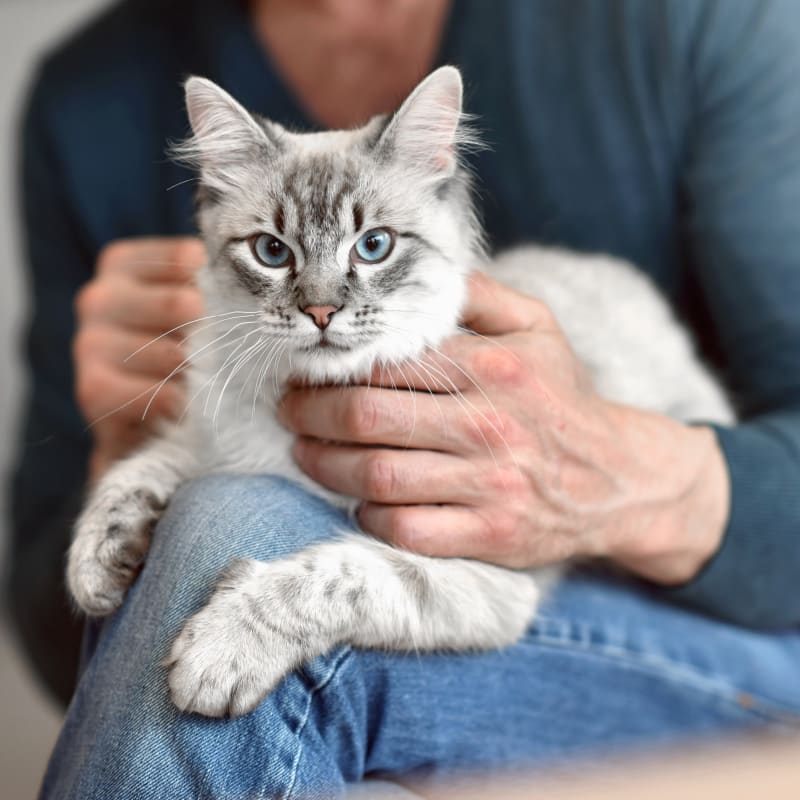Treatment for Senior Dogs & Cats
Our vets are here to help your companion animals retain their quality of life as they enter old age. Your senior pets will benefit from routine preventive veterinary care and early diagnosis throughout their golden years.
By providing your pet with proactive care throughout their life you help protect them, so it's important that they attend regularly scheduled wellness exams, even when they seem to be perfectly healthy.
Our veterinarians are here to help geriatric pets in Kanata and surrounding areas achieve optimal health by identifying and treating potential health concerns as the symptoms appear and providing proactive treatment as early as possible.

Common Health Problems
Thanks to the vast improvements in veterinary care including nutrition and diagnostic capabilities our pets are able to live longer, healthier lives.
While this is great news it also poses a new set of complications, pet owners and veterinarians will need to manage more age-related conditions in pets than they have in the past.
Some of the conditions most commonly seen in senior pets are:
- Joint or bone disorders
Geriatric Dogs
As your dog ages, there are many different joint or bone disorders that could potentially cause them pain and discomfort. Some of the most common joint and bone disorders in geriatric pets that our veterinarians diagnose and treat include arthritis, hip dysplasia, osteochondrosis, and reduction in spinal flexibility.
It is essential to manage these conditions early on in order to keep your dog comfortable as they continue to age. Some of the recommended treatments for joint and bone issues in senior dogs range from a tailored exercise program to the use of analgesics and anti-inflammatory drugs to surgery to remove diseased tissue, stabilize joints or reduce pain.
Geriatric Cats
Cats are known for masking symptoms therefore if your cat suffers from osteoarthritis then it may be more difficult to recognize the symptoms. While cats can experience a decrease in range of motion the most common symptoms of osteoarthritis in geriatric cats include weight loss, loss of appetite, depression, change in general attitude, poor grooming habits, urination or defecation outside the litter box, and inability to jump on and off objects.
- Kidney disease
As pets age, their kidneys tend to lose their function. In some cases, kidney disease can be caused by medications used to treat other common conditions seen in geriatric pets.
Unfortunately, there is no cure if a pet is experiencing chronic kidney disease, but there are solutions to help manage the symptoms allowing your pet to live comfortably.
- Cancer
Bringing your geriatric pet in for routine checkups even when they seem healthy allows your veterinarian to examine them for early signs of cancer and other diseases which typically have more positive outcomes when treated early.
- Heart Disease
Like people, our aging pets can be at risk of developing heart disease.
- Blindness and hearing loss
Degeneration in the eyes and ears can lead to varying degrees of deafness and blindness in older pets, especially in older dogs.
When these conditions are age-related they may come on slowly, which may allow your pet some time to adjust to their condition and compensate making it more difficult for you to notice the symptoms.
- Liver disease
Liver disease is a condition that affects senior cats and may be the result of high blood pressure or hyperthyroidism. Symptoms of liver disease in cats include loss of appetite, jaundice, drooling, vomiting, diarrhea, and increased thirst.
If your dog experiences liver disease it may cause several serious symptoms including seizures, vomiting, diarrhea, fever, jaundice, abdominal fluid buildup, and weight loss.
If your geriatric dog or cat is displaying any of the symptoms of liver disease, it is crucial that you seek veterinary care as soon as possible.
- Diabetes
Dogs and cats can develop diabetes at any age. Pets that are suffering from obesity have a higher risk of becoming diabetic.
Symptoms of diabetes in dogs and cats include increased thirst and urination, increased appetite accompanied by weight loss, cloudy eyes, and chronic or recurring infections. - Urinary tract disease
Pets experiencing urinary tract conditions and incontinence are commonly seen by our hospital. As the bladder muscles weaken in senior pets accidents will be more likely to occur, but it's important to note that incontinence could be a sign of a bigger health issue such as a urinary tract infection.
If you notice any signs of bladder or urinary tract conditions you should bring your elderly pet in to see their vet for an examination.
Veterinary Care for Seniors
Our vets discuss your pet's behaviors and activities, complete an examination and perform diagnostic tests that will be required to receive additional insight into their overall health.
We will recommend a health plan that can potentially include medications, activities and dietary changes that may help improve your senior pet's health, well-being and comfort.
Routine Wellness Exams
Preventive care is essential to helping your senior pet live a healthy, happy and fulfilled life.
Early detection of disease will help preserve your pet's physical health and catch emerging health issues before they have a long-term effect on the health of your pet.
With regular physical examinations, your pet will have the opportunity to live a long, healthy life well into their golden years.

